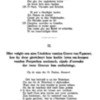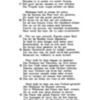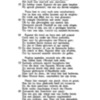Hier volght een nieu Liedeken vanden Grave van Egmont
Title
Subtitle
Digital Object
Image notice
Image / Audio Credit
Pamphlet: Amsterdam MI: 3978 6.1 c 16e Geuzen/Kui. Nederlandse Liederenbank
Set to tune of...
Transcription
Och hoe bedroeft is nu het Nederlant,
Om een die de Waerheyt is afgheweken,
Waer deur hy hem brochte in groote schant:
Hy die de waerheyt elck heeft laten preken
Is deur den schat der booser aert verblent:
En heeft Gods stem daerna seer corts versteken
Zijn fondament,, dat hy eerstwerf vast leye,
Is gantz geschent,, hier in s'Neerlants Contreye.
Seer vierigh was Egmont op d'eerste tijt
Hy geboot die Christ'nen Tempels te bouwen
Waer dat heel Vlaenderen was in verblijf,
Op hem stelden theel lant zijn betrouwen,
Zijnde Regent en Heer vant Vlaemse fleur,
Meynden sy te preken vry sonder flouwen,
Met groot getruer, moesten sy weer afbreken
Des Tempels muer, oogen sachmer om leken.
Madamme heeft so menige list geleyt,
Op dat Egmont den Paus weer sou gelooven,
Zy kende wel zijn groote giericheyt,
En dachte ick sal hem met gelt verdooven:
Ick sal hem koopen d'lant van Gaesbeeck schoon,
Hier me sal ick zijn sinnen meer berooven,
Dwelck zijn persoon, seer haestlijck accepteerden,
Maer wacht den loon, dat hy sulcx consenteerden.
Hier uut nam oorsaeck, Egmont armen bloet
Om dat die Beelden waren afgesmeten:
So heeft hy doen hangen oock metter spoet
Eenentwintich, tis waer so elck mach weten
En dartigh doen geesselen op dat pas:
Binnen Geertsberch quam hy nijdigh verbeten
Die van hem was, om sulck werck daer gesonden,
Beckerseel ras, volbracht in korte stonden.
Noch heeft hy doen hangen int openbaer,
Den Predikant uut Vlaendren, tot Aelst binnen
Die daer Gods woort gepredict had voorwaer
Daeraen machmen een recht Christen bekinnen,
Die voor Christum zijn leven hier verliest,
Salt voorwaer namaels weder seker winnen,
Dat hy verkiest, sal niemant hem ontrecken
Hoe seer dat briest, een Leeu in alle vlecken.
Noch heeft hy doen een nieu Verbont gemaeckt
Met Madamme die Regente verheven,
Dat te Willebroec den Prince wijs heeft versaect,
Hy en wilde daer gheen konsent in gheven
Den Prince wijs sprack Egmont wilt verstaen
Van Spaengien af, maect ghy tot hier beneven
Een Brugghe saen, die Ducdalf hier sal draghen
Tot u versmaen, u gheslaght salt beklaghen.
Doen Ducdalf was int Lant gekomen fier
Heeft hy secreet met zijnen Raet gesloten
Hoe dat hy't nae zijn hant sou stellen hier,
Om den Edeldom vast te houden in koten,
Als sommige Edelen dat hebben gehoort
Het heeft hun waerlick seer verdroten,
Zy hebben voort, Egmont dit aen gaen langhen.
Hy sprack ghestoort, wie sou my derren vanghen.
Twas hem te voor noch eens veradverteert,
Dat hy hem sou willen houwen uut de weghen:
Hy trock nae tHof, soo hy was gheuseert,
En vraegde Ducdalven met soeter zegen.
Oft hy zijn ghevanghen sou moeten zijn,
Gheveynst sprack Ducdalff na zijn oude plegen,
Een Prins te zijn, sou ick u gevangen houwen
Tis veer van mijn, t'mocht my namaels berouwen.
Egmont die trock na huys seer wel gemoet
Corts wert hy weder ten Hove ontboden,
Daer wert hy ghevanghen met Hoorne goet;
Zy haddent beyde tsamen wel ontvloden,
Zy zijn te Ghent ghevoert al opt casteel
En daer bewaert, al van de Spaensche Joden:
Dit creech te deel,, Egmont door zijn afvallen,
Dat hy tmorceel smaeckt bitterder als gallen.
Neghen maenden, weynich min ofte meer,
Den vijfden Junij, t'Brussel inde stede,
Sachmen schreyen menich huysghesin teer
Over die doot, van Egmont, Hoorne mede,
Zy storven beyde dien dach voor den noen
Egmont ghebruycte d'Afgodische zede,
Daer lach hy doen,, die twist hier had bedreven,
Maer Hoorne koen,, onschuldich liet zijn leven.
Neemt hier exempel, out, jonck, cleyn en groot,
Hoe dat hy hem ghebrocht heeft int verseeren
Hy die door giericheyt verkoos de doot,
Ende verliet onachtsaem d'wech des Heeren
Aenvaerde den Antechrist seer snoot:
Dus wie ghy zijt, wijckt niet van Godes leeren
Zijt niet ghesint,, als Egmont onghestadich
Die soo verblint,, was, Heer zijt hem ghenadich.
Oh how saddened the Netherlands are now,
Because of one who diverted from the Truth,
Which brought him to great shame.
He, who had others preach the truth
Is blinded by the treasure of a more evil nature.
And has abandoned God’s voice soon after.
His foundation, which he first had set in stone
Is now violated, here in the Netherland’s regions.
In the beginning Egmont was very fierce
He ordered the Christian’s Temple to be built
There where all of Flanders was staying.
In him all the country trusted,
Being Regent and Lord of Flemish flora.
Thinking they were preaching free of lies,
With great sadness, they had to tear down
That Temple’s wall, eyes were seen crying over it.
Madam devised so many tricks
So that Egmont would once again believe the Pope,
She knew his great avarice,
And thought ‘I will daze him with money,
I will buy him the land of Gaasbeek,
With this I shall rob him of his mind,’
Which his person accepted very hastily,
But for complying with such a thing there is a price waiting to be paid.
This was the cause, for Egmont’s poor blood,
Because it threw off those images,
So he was hung in haste as well.
Twenty-one, it is true, everyone may know
And tortured thirty in that step:
Within Geertsberg which was his, [being of] Beckerseel descent,
he came angrily bitter, sent there for such work, fulfilled in short order.
He also hung in public,
The Preacher from Flanders, from the city of Aelst,
Who preached God’s word there and had expanded from there.
One may acknowledge a real Christian from this,
Who for Christ loses his life,
Will indeed afterwards certainly win again,
For choosing [this], no one shall blame him.
How much that wind blows, a Lion in all stains.
So too he made a new Covenant,
With the elevated Madam Regent,
Which in Willebroek the Prince wisely forsook.
He did not want to give his consent there.
The Prince spoke wisely ‘Egmont will you listen,
Away from Spain makes you closer to here,
Soon a bridge, which the Duke of Alva will bear,
To your scorn, will sully your family.
When the Duke of Alva fiercely came into the Country
He secretly decided with his Council
How he would change things after his hand here,
To keep the Nobility imprisoned.
When some Nobles heard that,
It truly caused them great sorrow,
They then related this to Egmont.
He spoke, annoyed, ‘Who would dare capture me.’
It was again advised to him
That he should keep out of the way.
He went to the Court, so he was used to do,
And asked the Duke of Alva with sweeter words,
If he had to be his prisoner,
Disingenuously, the Duke spoke his old worries,
‘Being a Prince, were I to keep you prisoner,
It is a fear of mine, it may afterwards grieve me.’
Egmont went home very well assured,
Soon he was summoned to Court again,
There he was captured with the good Hoorne.
They would both, together, have been able to escape.
They were brought to the Castle in Gent, already possessed by the Spanish Jews, and kept there,
As a consequence, Egmont, because of his lapse [in faith],
tasted each morsel more bitterly than gall.
Nine months, little less or more,
The fifth of June, in the city of Brussels,
Many a family were seen crying tenderly
About the death of Egmont, and Hoorne too.
They died both that day before noon.
Egmont used the idolising custom,
There he lay then, who had been in strife,
But valiant Hoorne, innocently left his life.
Take example here, old, young, small, and large,
How that he had brought himself to qualify [for death],
He who through avarice chose death,
And carelessly left the path of the Lord,
Accepted the Antichrist very evilly.
So whoever you are, do not divert from God’s teachings,
Do not be of an unsteady mind, like Egmont
Who was so blinded, Lord have mercy on him.
Translation by Rena Bood
Gender
Date
Notes
1. ‘afgesmeten’ means ‘thrown off’ but it could be a misspelling as it does not seem to fit well within the context of the stanza. An option would be ‘afgemeten’ (‘measured’) or maybe ‘afgesetten’ (‘intentions’ both by one’s self and by others).
2. ‘Beckerseel’ was a town just outside of Brussels.
3. The final line reads like a saying but I am not familiar with it, nor could I find out in a quick search what it meant. ‘briest’ could mean both ‘wind’ and ‘snort’ (of livestock), and ‘vlecken’ is both ‘to sully something’ and ‘stains.’
4. ‘beklaghen’ in present-day Dutch means ‘complaining’ but here it is used to indicate sullying the name of his family.
5. Lots of marginalia on this pamphlet



